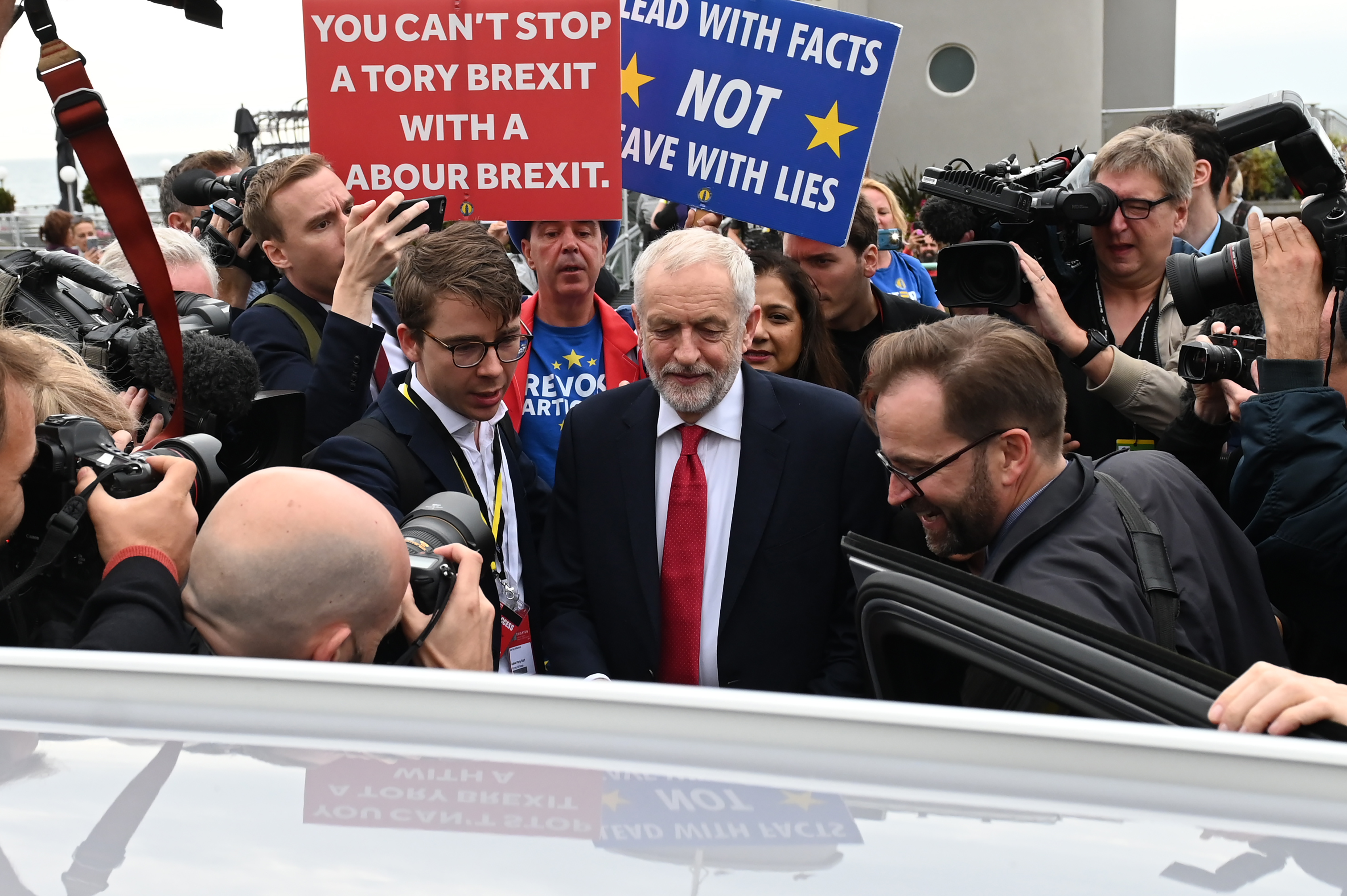What is Lexit?
Left-wing Brexiteers want to leave the EU on their terms

A free daily email with the biggest news stories of the day – and the best features from TheWeek.com
You are now subscribed
Your newsletter sign-up was successful
Brexit-supporting Labour members enjoyed a victory last week when their party voted against a motion forcing the leadership to back Remain in a second referendum.
Delegates at the annual party conference in Brighton instead backed plans put forward by Jeremy Corbyn under which a Labour government would stay neutral while negotiating a new deal with the EU within three months of coming to power.
Although a majority of Labour supporters are generally pro-EU, a third voted Leave in the 2016 EU referendum, says the New Statesman.
The Week
Escape your echo chamber. Get the facts behind the news, plus analysis from multiple perspectives.

Sign up for The Week's Free Newsletters
From our morning news briefing to a weekly Good News Newsletter, get the best of The Week delivered directly to your inbox.
From our morning news briefing to a weekly Good News Newsletter, get the best of The Week delivered directly to your inbox.
And there is a pro-Brexit caucus among left-leaning party members that believe the EU has an anti-progressive agenda. These Eurosceptics are among the voices calling for a “Lexit” - a left-wing Brexit.
So what are the left-wing arguments for leaving the EU?–––––––––––––––––––––––––––––––For more political analysis - and a concise, refreshing and balanced take on the week’s news agenda - try The Week magazine. Get your first six issues free–––––––––––––––––––––––––––––––
State ownership
Lexit supporters often argue that the EU is one of the biggest obstacles to achieving national ownership, says Politics.co.uk editor Ian Dunt.
A free daily email with the biggest news stories of the day – and the best features from TheWeek.com
And the European Left’s “attachment to the EU as an inherently progressive development prevents it from being radical, and indeed integrates it into the neoliberal structures of European capitalism”, argues Costas Lapavitsas, an economics professor at SOAS University of London, in his book The Left Case Against the EU.
The EU is allowed to prevent the emergence of a private or public monopoly in order to ensure competition, which means private providers must be treated to the same privileges as state providers. In addition, state subsidies must be available to all providers, whether private or public.
That said, member states can avoid these rules in order to “facilitate the development of certain economic activities”, for example, fulfilling a “universal service”, notes Politics.co.uk’s Dunt. In reality, this means that EU states are free to work around EU rules in order to own trains, banks and other service providers.
Indeed, the EU guarantees in its treaty that member states are in control of national ownership. “The treaties shall in no way prejudice the rules in member states governing the system of property ownership,” says the EU in Article 345.
An analysis by left-wing journal Renewal of Labour’s 2017 manifesto found that of Corbyn’s 26 economic proposals, none would be hampered by EU regulations.
Freedom of movement for employers
Freedom of movement for employers allows European businesses to move their operations to countries with lower wages and worse working conditions.
This is good news for businesses looking to save money, but bad news for employees - and the European Court of Justice (ECJ) has often sided with businesses.
Some high-profile legal cases have seen severe restrictions put on employees’ rights to strike in countries where companies were exploiting freedom of movement for cheaper labour, says politics.co.uk’s Dunt.
One such case is that of Viking Line, which operated a ferry between Finland and Estonia. The ferry sailed under the Finnish flag and employed its workers under Finnish rules, paying the crew Finnish wage levels.
When Viking started to lose money, the company decided to reflag the ferry as an Estonian ship, in order to employ workers from the cheaper Estonian unions.
However, following a boycott by unions, Viking backed down over the plan.
But when Estonia joined the EU, Viking applied to the European court for an injunction forcing the unions not to interfere with their freedom of establishment, which is protected under EU law.
The court ruled that industrial action in the EU has to be compatible with EU law, “so where they had the effect of limiting freedom of movement or association, they were unlawful”, says Dunt, adding that verdict “did a lot of damage to worker rights” in the bloc.
Freedom of movement for workers
Lexiteers argue that because the EU allows free movement between member states, wealthier countries that pay higher wages are more likely to see an influx of people seeking bigger rewards for their work.
The sudden rush of cheap labour undercuts wages, meaning businesses pay workers less for the same work, Lexiteers say.
But their opponents argue that this theory discounts the complex reality of immigration and its effect on the economy. Even if immigrants to a member state are willing to work for less than their native counterparts, their productivity will help domestic businesses, and their wages will go back into the local economy.
This argument is supported by Sir Stephen Nickell, the author of of economic research frequently used by leading Brexiteers as proof that immigration from the EU undermines British wages.
Accusing Brexiteers of grossly misrepresented his findings, the former senior official at the Office for Budget Responsibility told The Independent that the wage impact was “very small”.
“They [low-skilled workers] lose out by an infinitesimally small amount,” he added.
-
 Democrats push for ICE accountability
Democrats push for ICE accountabilityFeature U.S. citizens shot and violently detained by immigration agents testify at Capitol Hill hearing
-
 The price of sporting glory
The price of sporting gloryFeature The Milan-Cortina Winter Olympics kicked off this week. Will Italy regret playing host?
-
 Fulton County: A dress rehearsal for election theft?
Fulton County: A dress rehearsal for election theft?Feature Director of National Intelligence Tulsi Gabbard is Trump's de facto ‘voter fraud’ czar
-
 Who is Keir Starmer without Morgan McSweeney?
Who is Keir Starmer without Morgan McSweeney?Today’s Big Question Now he has lost his ‘punch bag’ for Labour’s recent failings, the prime minister is in ‘full-blown survival mode’
-
 Why the Gorton and Denton by-election is a ‘Frankenstein’s monster’
Why the Gorton and Denton by-election is a ‘Frankenstein’s monster’Talking Point Reform and the Greens have the Labour seat in their sights, but the constituency’s complex demographics make messaging tricky
-
 Reforming the House of Lords
Reforming the House of LordsThe Explainer Keir Starmer’s government regards reform of the House of Lords as ‘long overdue and essential’
-
 How long can Keir Starmer last as Labour leader?
How long can Keir Starmer last as Labour leader?Today's Big Question Pathway to a coup ‘still unclear’ even as potential challengers begin manoeuvring into position
-
 The high street: Britain’s next political battleground?
The high street: Britain’s next political battleground?In the Spotlight Mass closure of shops and influx of organised crime are fuelling voter anger, and offer an opening for Reform UK
-
 Biggest political break-ups and make-ups of 2025
Biggest political break-ups and make-ups of 2025The Explainer From Trump and Musk to the UK and the EU, Christmas wouldn’t be Christmas without a round-up of the year’s relationship drama
-
 ‘The menu’s other highlights smack of the surreal’
‘The menu’s other highlights smack of the surreal’Instant Opinion Opinion, comment and editorials of the day
-
 Is a Reform-Tory pact becoming more likely?
Is a Reform-Tory pact becoming more likely?Today’s Big Question Nigel Farage’s party is ahead in the polls but still falls well short of a Commons majority, while Conservatives are still losing MPs to Reform